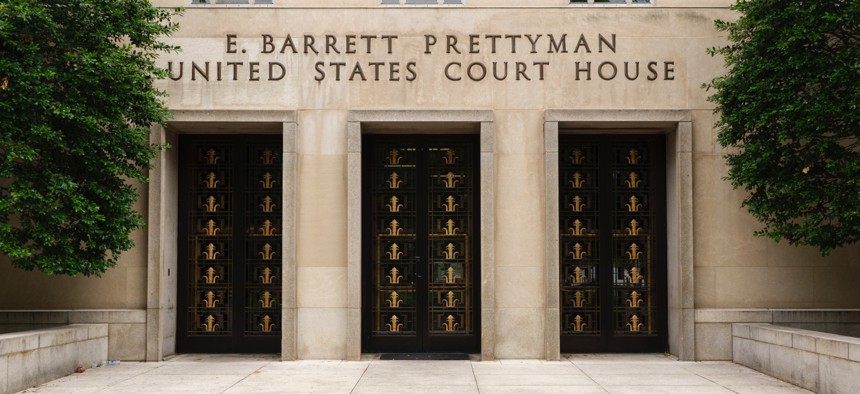
A federal judge determined that President Trump has overstepped his authority in singling out certain labor unions in his executive order ending collective bargaining at several federal agencies. Kevin Carter / Getty Images
Judge blocks Trump’s anti-union executive order for IFPTE-represented workers
U.S. District Judge Paul Friedman said the president “clearly” exceeded his authority when issuing an edict stripping two-thirds of the federal workforce of its collective bargaining rights.
A federal judge in Washington on Tuesday issued an oral decision blocking the Trump administration from terminating the collective bargaining rights of federal workers represented by the International Federation of Professional and Technical engineers across government, finding the president exceeded his authority when he tried to exclude two-thirds of the federal workforce from federal sector labor law.
U.S. District Judge Paul Friedman issued a preliminary injunction from the bench at the end of a hearing held in connection with IFPTE and other unions’ July lawsuit challenging President Trump’s March executive order, which cited a seldom-used provision of the 1978 Civil Service Reform Act to bar unionization at most federal agencies on national security grounds. This marks Friedman’s fourth decision in favor of labor groups in relation to the edict, which was appended in August to exclude even more agencies.
In the case, IFPTE, like several of its sister unions, had argued that the president’s purported determination that wide swathes of the federal government had a primary function of protecting national security was in fact a pretext to retaliate against labor groups for their Firat Amendment-protected conduct, such as challenging the administration’s workforce policies or otherwise pursuing workplace grievances against agency management. After reading lengthy quotes from the executive order, a controversial White House fact sheet asserting that unions had “declared war” on Trump and subsequent guidance from the Office of Personnel Management, Friedman agreed.
“So you’ve got retaliation, you’ve got animus, and you’ve got favoring some unions and not others. It’s clearly ultra vires,” Friedman said, referring to the legal term for when a president has overstepped their authority. “It clearly is . . . That’s in the fact sheet, that’s in the EO and that’s in the OPM guidance. Just reading those demonstrates how the plaintiffs in this case have been irreparably harmed.”
Friedman also rejected the administration’s argument that judges examining the legality of the order in discreet cases brought by individual unions must granularly examine the national security determination for each individual bargaining unit.
“Regarding the idea that one must parse, one by one, whether each bargaining unit met the criteria, why should the court do that, when the president didn’t?” he said. “The president didn’t do it granularly; there is no individualized determination as the statute suggests he should have done . . . [In a prior decision] I listed all of these different agencies . . . These are not agencies that apply just to national security or have as their primary function national security.”
And he contested both the government and Judge Karen LeCraft Henderson’s dissenting opinion in the U.S. Court of Appeals for the D.C. Circuit’s decision keeping an injunction in place for K-12 educators at the Defense Department that unions have not met the high burden needed to prove an ultra vires claim.
“I [previously] alluded to [ultra vires] as a ‘Hail Mary,’ but yet the courts have recognized sometimes it is the only avenue when statutes have been violated,” he said. “There is clear evidence in a case like this, where the administrative channeling apparatus [of the Federal Labor Relations Authority] has been neutered, or emasculated, or whatever the right word is. The executive order is in furtherance of unrelated policy goals. The president acted outside the narrow bounds of the national security exclusion to pursue improper goals, that is, to retaliate against unions.”
According to a draft order submitted by the plaintiffs, the administration will be barred from terminating collective bargaining agreements for IFPTE-represented Environmental Protection Agency workers, Defense Department workers represented by IFPTE, the American Federation of Teachers’ Overseas Federation of Teachers and several other plumbing, electrical and other trade unions, as well as the Metal Trades Department and International Association of Machinists at the U.S. Coast Guard and Energy Department workers represented by the Office and Professional Employees International Union.
Share your news tips with us: Erich Wagner: ewagner@govexec.com; Signal: ewagner.47
NEXT STORY: Trump administration is on track to cut 1 in 3 EPA staffers by the end of 2025







